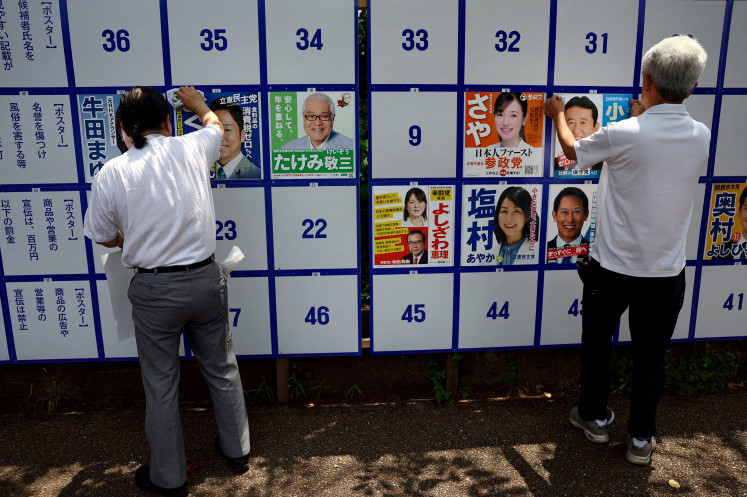Popular Reads
Top Results
Can't find what you're looking for?
View all search resultsPopular Reads
Top Results
Can't find what you're looking for?
View all search resultsGovernment allows hybrid work for civil servants
Given their relatively high job security, stereotypes of lazy civil servants persist among Indonesians.
Change text size
Gift Premium Articles
to Anyone
I
n a bid to improve the productivity of civil servants, President Joko “Jokowi” Widodo signed Presidential Regulation (Perpres) No. 21/2023 on Wednesday granting them greater working flexibility. Experts, however, have cautioned that the regulation could have the opposite effect, arguing that it is too soon for the government to implement flexible working arrangements for the civil service.
“State civil apparatus [ASN] members can perform their duties with flexibility, both in terms of location and in time,” Article 8 of the regulation states. Even if civil servants are to adopt this flexible working arrangement they will still have to work the required 37 hours and 30 minutes, or 32 hours and 30 minutes during Ramadan, per week as stipulated in the regulation.
In the past, regulations on shorter working hours during Ramadan had to be signed each year. While the latest regulation does not specify if overtime will be available for civil servants, hours spent working on top of the required time may count toward an employee’s performance.
The idea to grant more flexibility to civil servants has been mulled since last year, with Administrative and Bureaucratic Reform Minister Abdullah Azwar Anas saying in December that his ministry was preparing a ministerial regulation on the issue, also known as work-from-anywhere (WFA).
While Azwar cited the success of the work-from-home policy implemented during the COVID-19 pandemic as the reason behind his support for more flexible working arrangements, public policy expert Agus Pambagio warned the government against jumping the gun in implementing this regulation.
“They might want to consider doing a trial run for six months and review the results first,” Agus told The Jakarta Post on Monday. “Civil servants can be a bit of a law unto themselves, and if they’re provided with [flexible working arrangements], someone will have to take the responsibility of overseeing their work”.
Given their relatively high job security, stereotypes of lazy civil servants persist among Indonesians. In the past, various local public order agencies (Satpol PP) have even conducted raids in public places for civil servants who are no-shows during office hours.
Read also: WFH forever? Why not, say more and more employers and employees
The West Java administration has already implemented a post-pandemic flexible working policy for its civil servants, according to Agus. But he said that the policy’s impact on productivity had yet to be properly measured. “We can’t say if the policy’s good or not without proper data. The government has to review the data [from West Java] first,” Agus said.
Too soon
Chairman of the Indonesian Policy Analyst Association (AAKI) Trubus Rahadiansyah concurred, saying that the government should be setting a long-term goal in implementing the presidential regulation. “We’re still probably about 10 to 15 years away from fully implementing [flexible working arrangements],” Trubus said on Monday.
The key issue the government has to tackle, according to Trubus, is deciding which civil servants get to benefit from the flexible policy. While the regulation applies to both central and regional state institutions, several institutions are excluded from the new policy.
Members of the Indonesian Military (TNI) and civil servants working for ministries that deal with national security, together with officers and civil servants working within the confines of the National Police are ineligible for this concession, as is the case with civil servants working overseas.
Read also: Working from home could become new normal post-pandemic
Still, the regulation remains deliberately vague, leaving the specifics of the implementation to the respective ministries and state institutions. To dispel further ambiguity, the Administrative and Bureaucratic Reform Ministry said that it would come up with more comprehensive regulations on flexible working arrangement for civil servants.
“Flexible working hours don’t mean [civil servants] can work anytime they please, there will be a specific regulation on this,” ministry spokesman Mohammad Averrouce said, as reported by kompas.com. “As such, we will soon follow up the [presidential regulation] with a more technical regulation that will be applicable to all government institutions at national and local levels”.
While the presidential regulation singled out public service and operational support service institutions as exempt from official working hours, Trubus argued that they should be exempt from the remote working policy as well.
“Institutions such as the National Research and Innovation Agency perhaps could get away with remote working,” Trubus said. “But institutions that directly serve the public won’t have the same leeway.”










